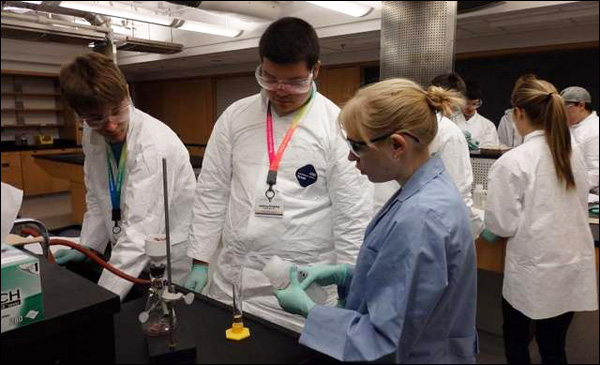
Northwest High School students from Clarksville, Tenn., learned to make solar cells out of blackberry juice and measure the electrical power produced by the juice during an April 24 educational outreach program sponsored by the Vanderbilt Institute of Nanoscale Science and Engineering (VINSE).
Small groups of students from several Tennessee high schools participated in daylong field trips to the VINSE laboratories on the Vanderbilt campus during October 2013 and March, April and May 2014 to give the students hands-on experience in science and technology.
“This gives the students a hands-on introduction to the power of nanotechnology,” said Sandra Rosenthal, the Jack and Pamela Egan Professor of Chemistry and director of VINSE. “Many scientists and engineers believe that structuring solar cells on the nanoscale will lead to more efficient, less expensive devices that will encourage more widespread implementation of solar power.” Rosenthal also is a professor of chemical and biomolecular engineering.
The students mashed blackberries, extracted their juice, soaked an electrode in the juice, coated another electrode with graphite and clipped them together to make a solar cell. After the solar cells were finished, the students got to measure the amount of electricity that each produced to see whose cell performed the best.
These crude devices don’t produce a lot of electricity – about enough to power a small electronic calculator – but they can give a person a small shock.
The students also examined the material that they used to make the solar cells with one of VINSE’s scanning electron microscopes. These instruments can magnify objects by as much as 500,000 times, enough to allow the students to see nanoscale features that are 50,000 times smaller than the width of a human hair. Students also learned how these tiny features can affect how much sunlight a solar cell can capture.
VINSE is sponsored by Vanderbilt University and includes faculty and students from the School of Engineering, College of Arts and Science and the School of Medicine. The field trips are coordinated by VINSE Program Coordinator and Outreach Facilitator Sarah Ross-Satterwhite and are also funded by a statewide program called TN-SCORE, designed to boost energy-related research and education across the state. TN-SCORE is supported by a $20 million award from the National Science Foundation’s Experimental Program to Stimulate Competitive Research.